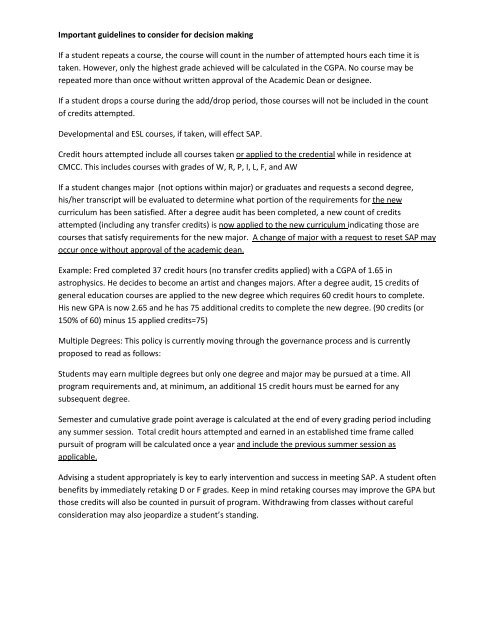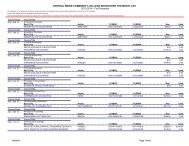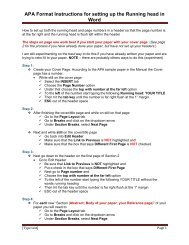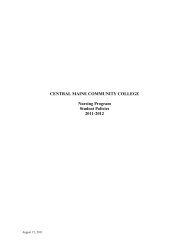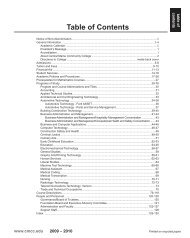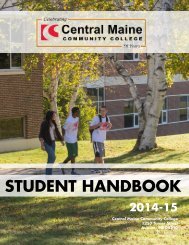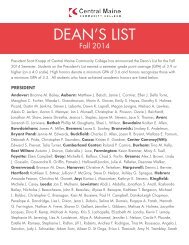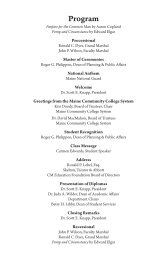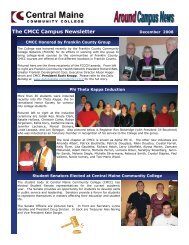Please go to www.cmcc.edu to review the entire Satisfactory ...
Please go to www.cmcc.edu to review the entire Satisfactory ...
Please go to www.cmcc.edu to review the entire Satisfactory ...
You also want an ePaper? Increase the reach of your titles
YUMPU automatically turns print PDFs into web optimized ePapers that Google loves.
Important guidelines <strong>to</strong> consider for decision making<br />
If a student repeats a course, <strong>the</strong> course will count in <strong>the</strong> number of attempted hours each time it is<br />
taken. However, only <strong>the</strong> highest grade achieved will be calculated in <strong>the</strong> CGPA. No course may be<br />
repeated more than once without written approval of <strong>the</strong> Academic Dean or designee.<br />
If a student drops a course during <strong>the</strong> add/drop period, those courses will not be included in <strong>the</strong> count<br />
of credits attempted.<br />
Developmental and ESL courses, if taken, will effect SAP.<br />
Credit hours attempted include all courses taken or applied <strong>to</strong> <strong>the</strong> credential while in residence at<br />
CMCC. This includes courses with grades of W, R, P, I, L, F, and AW<br />
If a student changes major (not options within major) or graduates and requests a second degree,<br />
his/her transcript will be evaluated <strong>to</strong> determine what portion of <strong>the</strong> requirements for <strong>the</strong> new<br />
curriculum has been satisfied. After a degree audit has been completed, a new count of credits<br />
attempted (including any transfer credits) is now applied <strong>to</strong> <strong>the</strong> new curriculum indicating those are<br />
courses that satisfy requirements for <strong>the</strong> new major. A change of major with a request <strong>to</strong> reset SAP may<br />
occur once without approval of <strong>the</strong> academic dean.<br />
Example: Fred completed 37 credit hours (no transfer credits applied) with a CGPA of 1.65 in<br />
astrophysics. He decides <strong>to</strong> become an artist and changes majors. After a degree audit, 15 credits of<br />
general <strong>edu</strong>cation courses are applied <strong>to</strong> <strong>the</strong> new degree which requires 60 credit hours <strong>to</strong> complete.<br />
His new GPA is now 2.65 and he has 75 additional credits <strong>to</strong> complete <strong>the</strong> new degree. (90 credits (or<br />
150% of 60) minus 15 applied credits=75)<br />
Multiple Degrees: This policy is currently moving through <strong>the</strong> <strong>go</strong>vernance process and is currently<br />
proposed <strong>to</strong> read as follows:<br />
Students may earn multiple degrees but only one degree and major may be pursued at a time. All<br />
program requirements and, at minimum, an additional 15 credit hours must be earned for any<br />
subsequent degree.<br />
Semester and cumulative grade point average is calculated at <strong>the</strong> end of every grading period including<br />
any summer session. Total credit hours attempted and earned in an established time frame called<br />
pursuit of program will be calculated once a year and include <strong>the</strong> previous summer session as<br />
applicable.<br />
Advising a student appropriately is key <strong>to</strong> early intervention and success in meeting SAP. A student often<br />
benefits by immediately retaking D or F grades. Keep in mind retaking courses may improve <strong>the</strong> GPA but<br />
those credits will also be counted in pursuit of program. Withdrawing from classes without careful<br />
consideration may also jeopardize a student’s standing.


